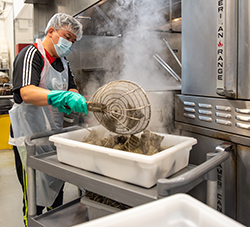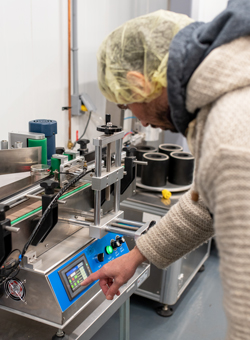Shared-Kitchen Rental Agreements
Shared-Kitchen Rental Agreements
A sample HUB-User agreement is attached for your review and use. The sample agreement template is based on a review of many current forms used by existing Food Hubs, and can be adapted to suit your HUB’s needs. Many earlier agreements combine application information and contract language. We have provided a traditional combined template, as well as separate application (designed to collect information about the User and its needs) and contract templates.
The function of the application is to collect information about a potential User and to inform the User of some HUB requirements. This information could then be used to build a contract for the User.
Sample Contract with Appendices
> Download Sample Application pdf | Word
> Download Sample Application Equipment Request pdf | Word
> Download Sample Contract pdf | Word
> Download Combined Sample Application Contract pdf | Word
Business Information
This is standard information. You might want to add a clause in terms that requires notification of change of ownership or contact information. It should also be noted that the agreement is not transferrable. Some food hubs also ask for website and social media links.
Processing Activity
It is standard to ask for the type of processing the User is interested in pursuing. What is your capacity for different types of businesses? Is the applicant interested in creating products in your shared-use kitchen or aggregating products for re-distribution? Are you planning to have different agreements for different categories of processors? Are you only interested in commercial businesses? Application vs contract.

Processed Products
It is important that you know what products a business is interested in processing, as it will impact on your capacity and equipment. What types of ingredients are coming into your hub with respect to allergens and how are they being managed (storage)?
User Prerequisites
All Users should meet a number of prerequisites before signing a contract and using the processing facility.
Terms
Terms
Terms include rental fees, payment method, and kitchen schedule, and may include storage fees and conditions. The contract should also include methods for changing the approved schedule, and consequences of non-payment. Fees are determined by the HUB and can be set up in a number of ways, including block fees, or a basic hourly rate. A summary of rental, schedule and storage is attached below as Appendix C. Including these details in an appendix will reduce the bulk of the contract.
Statement of what the Food Hub and User provide.
These statements should clearly state the responsibilities of the Food Hub and the User. It’s recommended that the Food Hub provides both cleaning chemicals and basic cleaning equipment.
Statement of Shared Responsibility
A statement of shared responsibility recognizes the collective responsibility of the HUB and all its Users to maintain a safe working environment. This is especially important when there are multiple Users.
Other terms

Housekeeping
This section refers to cleanup and maintenance by the user which is so important from a food safety perspective. Some of the more important ones include:
Cleanup and removal of User equipment, ingredients and end products Refer to cleaning guidelines and checklist (Appendix E). Who provides cleaning supplies and equipment? It’s recommended that the Food Hub provides cleaning chemicals and some basic equipment. How is your HUB planning to monitor cleanup? Will you allow more than one User in the processing facility at one time? If so, how do monitor cleanup if the schedules overlap? What are the consequences for failing to do a proper cleanup (loss of deposit and/or loss of privileges)?
Trash and garbage disposal. Clearly define where garbage and compostables should be deposited. It’s recommended that recyclables be removed by Users to manage.
Storage. Does your Food Hub have a storage policy outlining proper use of storage facilities? What can be stored and what must be removed from the Food Hub by the User? How does your Hub inform Users about storage policies? Storage policies could be included as an Appendix. Please refer to the Transportation, Purchasing, Receiving, Shipping, and Storage under the Operations section on background information.
Responsibility for damage and notification of required maintenance. While Users should use equipment responsibly, sometimes equipment breaks down and requires maintenance. Is the damage a result of improper or careless use? The Hub does not want Users to hide damage that may ultimately impact on other Users. It’s critical that Users notify the Hub when maintenance is required.
Health and Safety
The agreement should include statements outlining the responsibility of the HUB and Users for worker safety and safe working conditions as shown in the Sample Agreement.
The User has several responsibilities. For example, the User is responsible for supervision of kitchen workers, and the User must ensure that the User and its workers observe proper WorkSafe safety procedures. All User employees must be registered with the HUB manager and provide contact information. Only the User and its designated employees should be allowed in the kitchen. The User must report any personal injuries or property damage occurring at any time and in any way connected with the User’s use of the kitchen.
The HUB is responsible for maintaining the kitchen in a sanitary and condition, and ensuring that all equipment available to the User operates to health and safety standards. The HUB should retain the right to evict individuals from the facility if their conduct is deemed to be destructive or detrimental. Furthermore, the HUB should retain the right to enter and inspect operations at any time during use. The local health authority and/or any other governmental food and safety authorities should also have the right to inspect without prior notice at any time
Other conditions
Confidentiality
Given that a User may have exclusive product or other privileged business information, it’s important that any information shared with the HUB should be protected.
Security Deposit
All Users should be required to provide a refundable security deposit in the vent of damage. The User may also default the security deposit in the event that the processing facility is not maintained in the expected condition.
Indemnification and Liability
A statement of indemnification and liability should be included in the contract, as a protection for the HUB. The example include in the sample contract is quite simple. Some statements are more complex, often based on a legal opinion.
Termination and Terms of Renewal
Reasons for and conditions of termination should be included in the contract including voluntary both termination and default of contract conditions T. The contract should also specify start and end dates, with options for renewal by the User.

Appendices
Appendix A Sample Product Lists
It’s important that HUBs maintain an up-to-date list of record of products being produce by Users, including potential allergens. Local; Health Authorities may also require a list of ingredients. These lists can be attached as an attachment to the base contract. Two versions are included here: One for processors and another for caterers and food trucks whose menu items may change more frequently.
> Download Sample Food Service Product List pdf | Word
> Download Sample Processor Product List pdf | Word
Appendix B Sample Equipment List
A list of equipment approved for use by a User. The sample list can be edited to fit with equipment owned by the HUB. The checklist indicates that HUB has reviewed and approved the list with the knowledge of the User.
> Download Sample Equipment List pdf | Word
Appendix C Sample Terms
The sample document list illustrates one method of listing payment options and can easily be edited to reflect the HUB system. The document also includes the a schedule preferred by a User as well as storage needs. The completed form provides evidence that the HUB Management has reviewed the requests and indicates the approved options.
> Download Sample Terms pdf | Word
Appendix D Sample Orientation Checklist
User orientation is an important step in the agreement process. This checklist form, which can be adapted to a HUB’s preferred orientation process, provides a record that the HUB Management and the User have completed the overview together.
> Download Sample Orientation Checklist pdf| Word
Appendix E Sample Cleanup Checklist
Maintaining a safe food processing environment is critical to the ongoing success of the HUB and all its Users, especially when here are multiple Users. This checklist could be completed after each use of the shared-use kitchen and deposited with the HUB. Alternately, this information could be presented as a reminder poster posted by the exit.
> Download Sample Cleanup Checklist pdf | Word
Other appendices
The HUB may choose to include other information to the contract, based on Standard Operating Procedures. For example, the HUB may want to attach its storage policies as a signed appendix.

